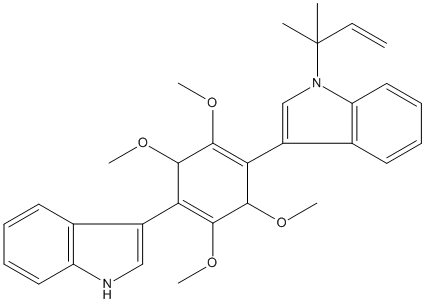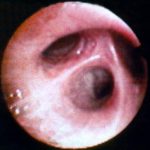Date: 26 November 2013
Secondary metabolites, structural diagram: Trivial name – Asterriquinones (1)
Copyright: n/a
Notes:
Species: A. terreusSystematic name: 1H-Indole, 1-(1,1-dimethyl-2-propenyl)-3-[4-(1H-indol-3-yl)-2,3,5,6-tetramethoxyphenyl]-Molecular formulae: C31H32N2O4Molecular weight: 496Chemical abstracts number: 78279-80-8Selected references: Arai, Kunizo; Shimizu, Sakae; Yamamoto, Yuzuru (Fac. Pharm. Sci., Kanazawa Univ., Kanazawa 920, Japan). Chem. Pharm. Bull., 29(4), 1005-12 (English) 1981.
Images library
-
Title
Legend
-
High resolution CT scan images with reconstruction of 1mm thick slices at approximately 10mm increments. The scan shows moderately severe multi-lobar cylindrical and varicose bronchiectasis predominantly centrally and in the upper lungs. There is no mucus plugging seen.
The features are in keeping with allergic bronchopulmonary aspergillosis
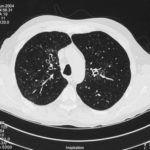 ,
,  ,
, 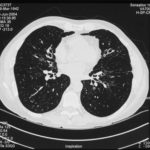
-
pt.SB – 6/10/98 – bronchocentric granulomatosis. CT scan showing multiple small nodules of variable size in both lung fields, apparently close to the vascular bundles.

-
Bronchial oedema.Remarkably oedematous bronchial mucosa, as seen in ABPA.
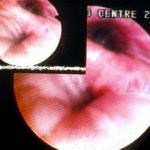
-
An example of longstanding allergic bronchopulmonary aspergillosis in a patient who has been steroid dependent for over 15 years showing remarkable kyphoscoliosis and honey combing and fibrosis of both lungs.
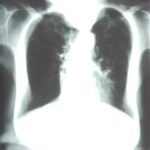
-
Recurrent pulmonary shadows 1. 6 Jan 1988 – chest radiograph showing right hilar enlargement, consistent with ABPA.
Recurrent pulmonary shadows 1. 3 Feb 1989 – chest radiograph showing right upper-lobe consolidation and contraction consistent with obstruction of RUL bronchus, in ABPA.
Clearing of pulmonary shadows 3, pt BJ. 5 April 1989 – resolution of shadows seen in February, with a course of corticosteroids.
Recurrence of pulmonary shadows 4, pt BJ. 2 September 1989 – recurrence of pulmonary shadows with an exacerbation of ABPA.
Central bronchiectasis, pt BJ. CT scan of thorax October 1989 showing central bronchiectasis, characteristic of ABPA (and cystic fibrosis).
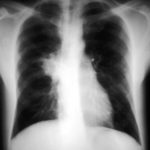 ,
,  ,
,  ,
, 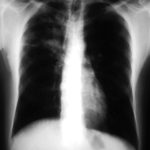 ,
, 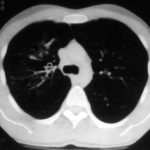
-
A typical example of a wet mount of a sputum sample from a patient with allergic bronchopulmonary aspergillosis.


